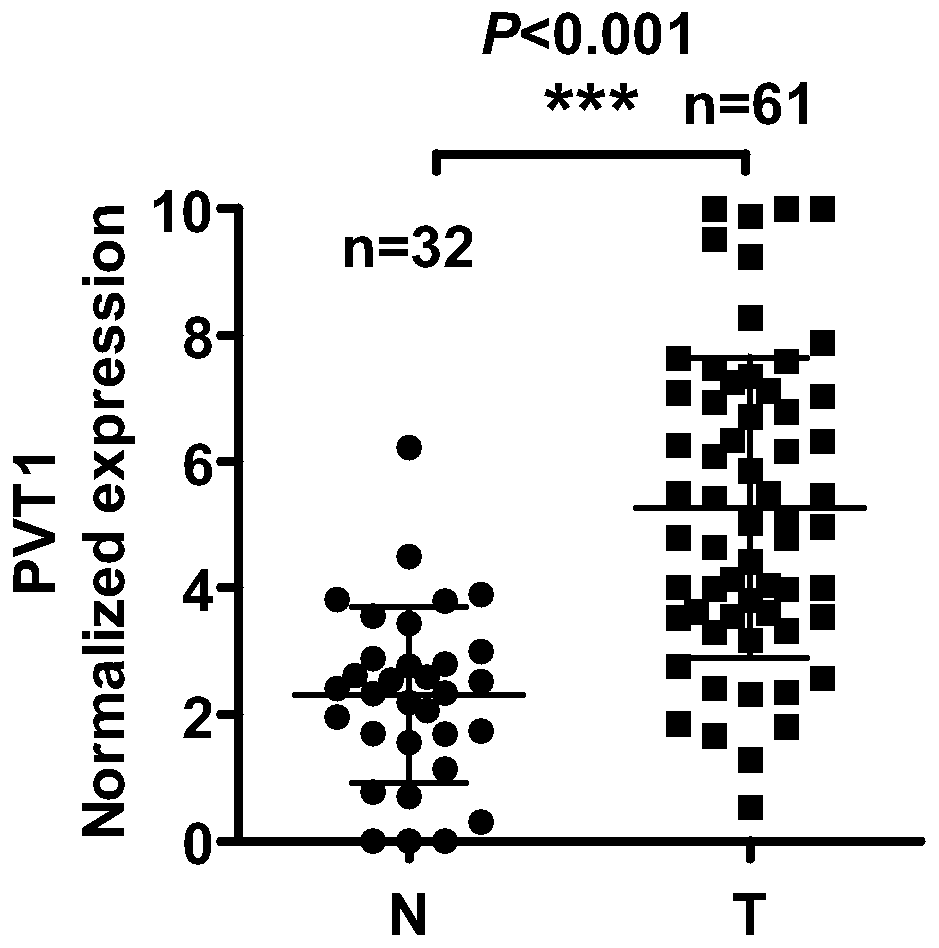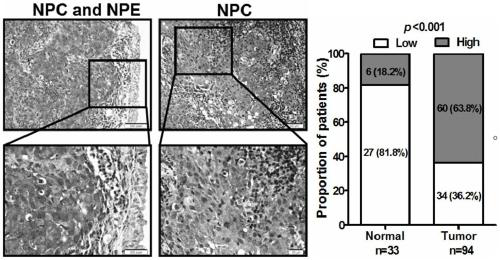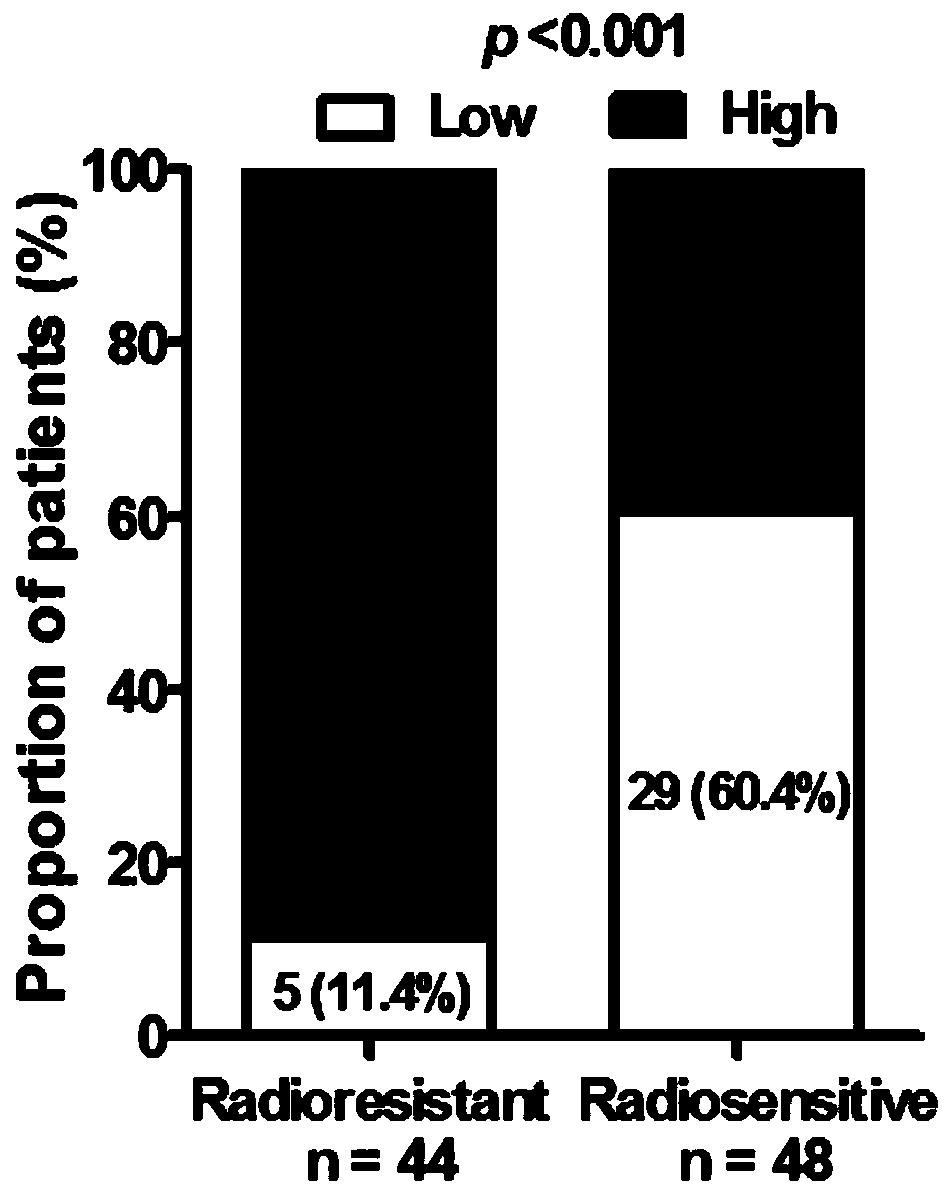Application of reagents for detecting the expression level of long-chain non-coding RNA PVT1 in the preparation of diagnostic reagents for nasopharyngeal carcinoma
A long-chain non-coding and detection reagent technology, applied in the field of detecting long-chain non-coding RNA PVT1 reagents and preparing nasopharyngeal cancer diagnostic reagents, can solve the problems that radiation cannot completely kill tumor cells, patient death, poor prognosis, etc. Clinically significant effect
- Summary
- Abstract
- Description
- Claims
- Application Information
AI Technical Summary
Problems solved by technology
Method used
Image
Examples
Embodiment 1
[0025] Example 1, real-time fluorescent quantitative PCR method detection confirmed that PVT1 was up-regulated in nasopharyngeal carcinoma
[0026] 1. Materials and methods:
[0027] 32 cases of normal nasopharyngeal epithelial tissues and 61 cases of nasopharyngeal carcinoma tissues were collected, total RNA was extracted, 2 μg RNA was reverse transcribed into cDNA, and real-time fluorescent quantitative PCR was performed. PVT1 forward primer is 5'-TGG CTG AGA GGG TTG AGA TC-3' as shown in SEQ NO:2, and reverse primer 5'-GCT GTA TGT GCC AAG GTC AC-3' as shown in SEQ NO:3 .
[0028] The GAPDH forward primer used for the control is 5'-ACCACAGTCCATGCCATCAC-3' as shown in SEQ NO:4, and the reverse primer 5'-TCCACCACCCTGTTGCTGTA-3' as shown in SEQ NO:5.
[0029] Real-time fluorescence quantitative PCR reaction system
[0030]
[0031] Real-time fluorescent quantitative PCR reaction steps
[0032]
[0033]
[0034]After the reaction, the amplification curve and melting...
Embodiment 2
[0037] Example 2, In situ hybridization detection found the expression of PVT1 in nasopharyngeal carcinoma, and its correlation with patient prognosis and radiotherapy sensitivity
[0038] 1. Material method
[0039] 1.1 Design and synthesis of hybridization probes
[0040] In order to detect the expression of PVT1 by in situ hybridization, we designed two groups of oligonucleotide probes for detection of PVT1 expression by in situ hybridization and three positive control in situ hybridization oligonucleotide probes.
[0041] Oligonucleotide probes for detection of PVT1 expression by in situ hybridization:
[0042] PVT1 probe 1: 5'-GGTCGGACTAGAAAACCGGTCTTCCTCTAATTTT-3' as shown in SEQ NO:6,
[0043] PVT1 probe 2: 5'-GAGACTGTAAAAACTTCTCAGGTCTTAGGA-3' as shown in SEQ NO:7,
[0044] PVT1 probe 3: 5'-CTCATAAAACTCTAACCTCTTAATTCTCGGTCAG-3' is shown in SEQ NO:8.
[0045] Positive control probe (to detect the housekeeping gene GAPDH):
[0046] GAPDH probe 1: 5'-CCACTTTACCAGAGTTAA...
Embodiment 3
[0110] Example 3, construction of shRNA vectors to interfere with the expression of PVT1
[0111] 1. Material method
[0112] 1.1 Reagents and kits
[0113] Restriction enzymes Hind III, Bgl II, EcoR I and Cla I, T4 DNA ligase, etc. were purchased from TakaRa;
[0114] TRIZOL TM Reagent (Invitrogen);
[0115] Plasmid Extraction Kit (#D6943-01, OMEGA);
[0116] Gel recovery kit (#M5212, OMEGA);
[0117] Reverse transcription kit (#A3500, Promega);
[0118] Antibiotic G418 (Ameresc).
[0119] 1.2 Design of shRNA
[0120] First, input the PVT1 sequence into Invitrogen's Block-It RNAi designer software to find the best shRNA target of the lncRNA, and select the best 3 corresponding target sequences as follows:
[0121] shRNA-1: GGACTTGAGAACTGTCCTTA as shown in SEQ NO: 12,
[0122] shRNA-2: GCTTCTCCTGTTGCTGCTAGT as shown in SEQ NO: 13,
[0123] shRNA-3: GCTCCACCCAGAAGCAATTCA shown in SEQ NO: 14,
[0124] The widely used Scramble sequence without any target in the human ...
PUM
 Login to View More
Login to View More Abstract
Description
Claims
Application Information
 Login to View More
Login to View More - R&D
- Intellectual Property
- Life Sciences
- Materials
- Tech Scout
- Unparalleled Data Quality
- Higher Quality Content
- 60% Fewer Hallucinations
Browse by: Latest US Patents, China's latest patents, Technical Efficacy Thesaurus, Application Domain, Technology Topic, Popular Technical Reports.
© 2025 PatSnap. All rights reserved.Legal|Privacy policy|Modern Slavery Act Transparency Statement|Sitemap|About US| Contact US: help@patsnap.com



